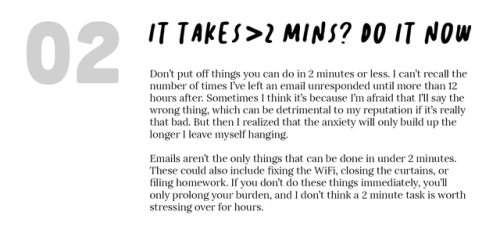Realmente Preciso Disso.
Realmente preciso disso.







SOURCES + LINKS
Dr. Bradberry, Travis. (January 15, 2018). “How to make yourself work when you don’t want to.” Retrieved from: https://medium.com/the-mission/how-to-make-yourself-work-when-you-dont-want-to-f4f251a85514
MacLellan, Lila. (January 15, 2018). “How to stop procrastinating.” Retrieved from: https://work.qz.com/1159212/how-to-stop-procrastinating/
Sun, Michael. (February 17, 2014). “Psychological Skills: Changing your Emotions - An Intro to Cognitive Reappraisal.” Retrieved from: https://www.psychologyinaction.org/psychology-in-action-1/2014/02/17/psychological-skills-changing-your-emotions-an-intro-to-cognitive-reappraisal
My masterposts, infographics, printables, + more!
More Posts from Lokarprincipal and Others
Um prédio vazio, para um conjunto de ideias 💡 💡 💡 vazias.



French Communist Party Headquarter
Architect Oscar Niemeyer
Bom saber
problem solving tips that actually worked for me
Hey there!
If you have a math, or science related subject (like I always do), you’ll find that you really can’t escape analysis and problem solving, especially if you’re majoring in something science or maths related. So I am here to share some tips that actually made studying technical subjects a little bit easier and manageable for me in college:
Practice solving. If you have a subject that requires you to solve, you really have to practice solving, there is no easy way out of this one. This allows you to develop your own technique in solving the problem. You can start by doing the problems you did in class, then venture out to some examples in textbooks, then further into the problems in the textbooks until you get the hang of how the concepts and theories are applied.
Listen during class. I know, it’s boring. But you have to do this. This way, you’ll be able to understand the topic once it is presented to you. In my opinion, it’s better if you let an expert explain it because they know the important bits in the lesson. Then study it afterwards on your own to develop your own techniques.
Ask your professors. Don’t be afraid to ask questions in class. Or if you’re shy, you can ask them after the class. However, it’s important that you ask them about the lesson when you already did your part; meaning: you already studied the material/solution over and over again but there’s just something that you can’t seem to grasp.
Study before the class. Studying the lesson in advance doesn’t hurt. Plus, it works because you already have an idea about it. However, I don’t do it usually. What I do is that prior the discussion, I study the lessons that are going to be essential to the next topic. Example: Say that our topic later will be about introduction to thermodynamics (which includes derivation of various thermodynamic formulas); what I’m going to study instead is the different integration and derivation techniques, and different basic thermodynamics concepts like laws of thermodynamics. This ensures me that I know the prerequisite lessons of the next topic in class.
Absorb the conceptual parts of the topic first. Before diving into the problems itself, try to digest the concepts or theories behind it first. This way, you can understand which information is important and easily think of a solution because you know the problem’s framework. Even when your professor gives you a problem that seems different from your other sample problems, the concepts will still be the same throughout.
Reverse engineer the solution. Reverse engineering is reading and understanding your solution from bottom to top. I do this to make connections while going through the solution. I usually ask myself “‘where did this come from?’, ‘why did this happen?’, or ‘why is the answer like this?’” It allows me to look into the parts that I missed which are usually concepts or theories that I forgot to apply in solving the problem.
Look for key terms or phrases. There are some problems that put in information that may seem unimportant, but actually is really important. Examples such as the phrases constant velocity, constant acceleration, starting from rest, accelerate uniformly, reversible isothermal, adiabatic conditions, isobaric/isochoric compression/expansion, etc., are easy to miss but actually gives you vital information especially when solving a problem.
Try to ask yourself how or why it happened in every step of the solution. You can do this to gauge your mastery of the lesson. If you can answer yourself confidently, then you’ve studied well enough. But, if you can’t or if you feel that it’s not enough, then you better get your pen, paper, and calculator to practice some more.
If you have to draw it, draw it. Some problems need the use of your imagination, and these problems are the ones that get tricky most of the time. It’s easier to draw each of the time frames that are important so you get the sense of what’s going on between these pictures. This way, you’ll know which information you’re missing and which ones are you failing to take into account.
It’s okay to be messy and slow while practicing. Not all of time you can solve in a tumblr-esque manner because, dude, tumblr notes or solutions are soooo pretty to look at, BUT, what’s more important is that you understand each step of the solution and how the answer came to be 8.0658 m/s directed 32° south of west. So it’s okay to have dashes, strikethroughs, and crosses on your scratch paper, as long as you’re learning, a messy solution on a paper you’re not going to submit to your professor is fine.
IF YOU’VE REALLY GOTTEN THE HANG OF SOLVING IT, try to solve a fresh set of problems as fast and accurately as you can. Try to solve as if you’re in an exam. This is also to gauge how well you’re prepared for it, but you need to do this accurately. I repeat, accurately. It doesn’t work if you’ve finished it in less than an hour but all of your answers are wrong.
Rest. If you know that you’ve done a good job, then take your mind off of everything first and let it wander to wherever it wants to wander. You deserve it ✨
O cara é duro na queda.
-Mami, ¿podemos ver a los campeones olímpicos? No, tenemos al abuelo en casa.
Ooooohh

Belíssimo
Snake fist by beautiful Sun Linya 😍🐍
Que bela paisagem.

between seasons (by doraartem)
Super Cute

Strawberries anyone?

Fofa

-
 nepaschercheracomprendre liked this · 10 months ago
nepaschercheracomprendre liked this · 10 months ago -
 twadi-gurl reblogged this · 11 months ago
twadi-gurl reblogged this · 11 months ago -
 missbittersweetdisaster liked this · 1 year ago
missbittersweetdisaster liked this · 1 year ago -
 inirbag15 reblogged this · 1 year ago
inirbag15 reblogged this · 1 year ago -
 the-elf-barbarian liked this · 1 year ago
the-elf-barbarian liked this · 1 year ago -
 irmisc liked this · 1 year ago
irmisc liked this · 1 year ago -
 thelauraxspeaks liked this · 1 year ago
thelauraxspeaks liked this · 1 year ago -
 lavendermoonbagel liked this · 1 year ago
lavendermoonbagel liked this · 1 year ago -
 scabball liked this · 1 year ago
scabball liked this · 1 year ago -
 meowing-whispers liked this · 1 year ago
meowing-whispers liked this · 1 year ago -
 texasgirlinspired liked this · 1 year ago
texasgirlinspired liked this · 1 year ago -
 currereismycure reblogged this · 1 year ago
currereismycure reblogged this · 1 year ago -
 arvoredejupiter reblogged this · 1 year ago
arvoredejupiter reblogged this · 1 year ago -
 pickyourpoisonmydear liked this · 1 year ago
pickyourpoisonmydear liked this · 1 year ago -
 tioleanaresma liked this · 1 year ago
tioleanaresma liked this · 1 year ago -
 hoaxsuicide liked this · 1 year ago
hoaxsuicide liked this · 1 year ago -
 ariaxoxox liked this · 1 year ago
ariaxoxox liked this · 1 year ago -
 taievieu liked this · 1 year ago
taievieu liked this · 1 year ago -
 rabsutosschal liked this · 1 year ago
rabsutosschal liked this · 1 year ago -
 languagesandstuff reblogged this · 1 year ago
languagesandstuff reblogged this · 1 year ago -
 just-vanya liked this · 1 year ago
just-vanya liked this · 1 year ago -
 kawaiiphotographynaturesuitcase liked this · 1 year ago
kawaiiphotographynaturesuitcase liked this · 1 year ago -
 woodyoukindly liked this · 1 year ago
woodyoukindly liked this · 1 year ago
